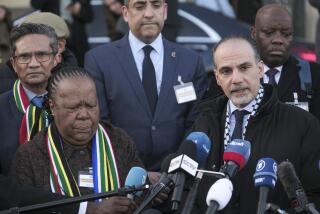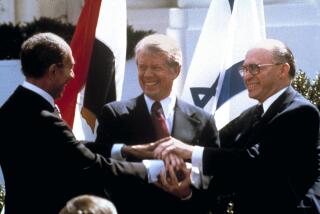No Time to Change Plans
- Share via
The newest peace-keeping operation of the United Nations, this one in Namibia, has had a tragic start for which many must share responsibility. Chaotic and confused as the situation is, however, there is nothing to justify South Africa’s threat to nullify the international agreement that the peace force is to implement.
At the base of the problem was a decision to go ahead with the April 1 implementation of the independence plan for Namibia despite irritating delays among haggling United Nations members, some of them more concerned about cost-cutting than peace-making. Those delays denied the staff time to put in place an adequate peace-keeping force. The risk of that decision became clear in the first hours after the agreement came into force, when heavily armed members of the South-West People’s Organization (SWAPO) started a major movement within Namibia, some reportedly from their bases in Angola in violation of the terms of the agreement. Their return to their native land was to have been made in May under careful supervision that would have included disarmament measures.
South Africa, which has been ruling the vast territory illegally, found its police overwhelmed. The U.N. Transition Assistance Group (UNTAG) was equally overwhelmed, with only 921 of the 4,650-member peace-keeping force in place, and they without adequate transport and communications. So South Africa was authorized by the U.N. commander to mobilize military units that had returned to barracks under the peace agreement, and they joined the police in resisting the incursion. A battle raged that has taken more than 200 lives, most of them Namibians whose primary objective appeared to be a celebration of the approaching independence of their nation.
Sam Nujoma, leader of SWAPO, the guerrilla movement, has sought to place all the blame on the United Nations and on the South African forces. But the role of his field commanders in encouraging this violation of the carefully crafted peace agreement will only make more difficult the restoration of confidence as Namibia moves toward free elections. There may indeed have been an overreaction by the South African units to the incursion, which seems to have involved no acts of aggression initially and no more than 2,000 men. But those who crossed from Angola were, in fact, in violation, and at least the SWAPO leaders knew that. Only time will permit a fair judgment of the decision by the U.N. commander to authorize the South Africans to leave their barracks and resist the incursion.
But the task now is not to abandon the plan to bring Namibia to independence at long last. The task is to repair the peace plan, get it back on schedule and clear the way for elections at the end of this year. South Africa is wrong in arguing that the election schedule cannot be met. SWAPO can contribute significantly to the restoration of the timetable by seeing that there is absolute respect of the agreement now. The United States has an important role as well. So far, most of the American share of the peace-keeping operation is locked up in congressional budget balancing, which is imperiled by the Gramm-Rudman-Hollings rules. President Bush’s commitment to prompt and full funding needs now to be matched by a commitment from congressional leaders who, like the President, must realize that this assessment of $129 million is small by comparison with the cost of a failed mission and a foiled peace plan.
More to Read
Sign up for Essential California
The most important California stories and recommendations in your inbox every morning.
You may occasionally receive promotional content from the Los Angeles Times.










